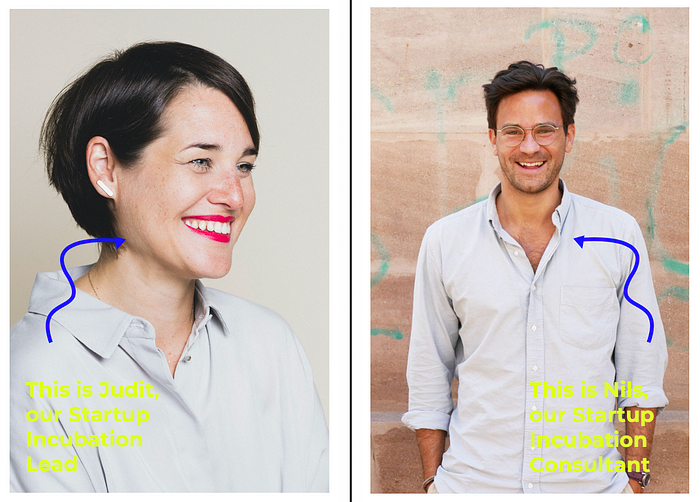How we Choose Startups for our Incubation Program — And why Business Plans Don’t Matter
Interview with Judit Klein & Nils Lenhardt by Anne Christin Braun
At ZOLLHOF we are either right in the middle of our 6-months incubation program or we are preparing an upcoming batch. Actually, most of the time both happen at the same time.
As we want to get to know the startups we work with thoroughly, we like to invest quite some time in our application process. We’ve had more than 50 startups going through our program in the past 3 years. While generally only 10% of all startups make it, our ZOLLHOF startups show an impressive 80% survival rate.
But what are the qualities we look for in a startup and how do we spot if a team might not be the right fit for our program? Nobody knows better than the two brains behind our incubation program: Judit Klein, our Startup Incubation Lead and Nils Lenhardt, our Startup Consultant.

I. What are the main aspects you look for when you screen batch applications and talk to founders?
Nils: There are 4 main points that are absolutely crucial for us when evaluating startups:
- Degree of Innovation 25%: How crucial is your problem for the future and how deep is the impact of your (plannned) solution?
- Team & Values 25%: Are our values drive, ownership, positivity, appreciation in sync with yours?
- Problem > Solution 25%: Are you really focusing on the problem or are you in love with your solution?
- Potential to move fast 25%: Show us what has happened since you’ve started your startup/idea!
II. Why does the composition of founding teams play such a crucial role in your selection process?
Nils: Since getting started, we‘ve reviewed over 500 applications, guided 40+ teams through our 6-month incubation program and witnessed the Founder’s Dilemma very closely. What stands out is that, in over 30% of all teams incubated, the founders struggled to come to an alignment about their common goals and parted ways. Afterwards the businesses blossomed since they were free of dead weight. Our goal is to find teams with a wide range of skills, where roles are split in a complementary way and a common vision for working together is shared.
Judit: We are working with startups at a rather early phase in their lifecycle. This is a very fuzzy stage, where nothing is really stable — there are a lot of question-marks and hypotheses which the team has to test and validate. The idea might change, the target customers or markets might change any day, there might be new features necessary to better meet customer needs and so on and so forth. It is a turbulent time which requires hard work and hard decisions oftentimes while dealing with financial and time pressure. If the founding team is constantly changing or not aligned when it comes to the core elements of working together such as commitment, values, goals, it is tough to perform, get things done and meet those hard decisions. That is why we spend a lot of time in the selection process and also in the incubation program on these ‘soft’ elements because we want to make sure that these teams have a rock solid foundation, one which they can build on and thrive.

Another aspect we look at is the complementary skillset and the background of the founders in relation to what they want to do- whether they have an unfair advantage on the team level that they can leverage for the sake of the startup. For example, if a team wants to build a digital health or telemedicine startup, it is ideal if they are familiar with the industry, have medical background/access to networks. Finally, we look for passionate and ambitious teams who are burning to solve a problem or to challenge the status quo which takes focus and resilience.
III. A lot of times we hear and read about the importance of rock-solid business plans. What is your take on that, especially for early stage startups?
Judit: To quote Steve Blank, a serial entrepreneur from Silicon Valley and the co-developer of the lean startup method which we apply a lot at ZOLLHOF:
“Unless you have tested the assumptions in your business model first, outside the building, your business plan is just creative writing.” — Steve Blank
What does he mean with that? Developing a business plan is important in the right time and for the right reasons. It is necessary for fundraising which mostly happens once you have figured out the most crucial cornerstones of your business, such as what is your business model (i.e. how do you earn money) which includes who your customers are and what your offering is. Answering these questions however, takes a lot of testing, validation and iterations. As early stage startups have limited resources, we always recommend them to focus on getting real numbers and real feedback instead of investing too much energy and effort into writing up a lengthy and complicated business plan filled with projected and hypothetical numbers (mostly drawn from secondary market analysis and trend research). These projections are not likely to hold up as soon as there is any iteration in the business model — which happens more often than not in this exploration phase.
IV. Looking at the startups you’ve worked with in recent years, do you see a pattern with those who have been especially successful?
Nils: From my personal experience, problem driven founders tend to be more likely to succeed than solution driven founders.
Judit: Behind all stellar startup success there is a hard-working, resilient, ambitious and aligned (founding) team. So here we go again with why this aspect is incredibly important for us when we scout startups.
V. What is your one piece of advice you want to give to (potential) founders?
Nils: Stay curious about your customer’s needs and thus your necessary features. Prefer slim MVPs over hand-coded solutions. Keep on iterating with your collected feedback. Create traction — traction trumps everything!
Judit: Do not develop your idea/business in a vacuum. Get out of the building (or set up video calls ;)) and talk to as many people as possible. With every bit of feedback from experts and potential real customers, preferably in their real environments, you better understand to whom and how your solution can provide real added value. It’s important that you talk to people, who don’t know you well or at all so that you avoid receiving false positive reinforcement that you probably would get from your supporting network (friends & family). Aiming for such moments of truth is crucial in developing solutions that people want or need.
Not developing your idea in a vacuum also means that you consider the external (political, economical, societal, technological and environmental, aka PESTEL analysis) factors that may have a great impact on your business. The pandemic, however extreme, is a good example for how things outside of our control can bring fundamental change.

If you’d like to apply for our upcoming winter batch, please find more information here.
Judit Klein is Startup Incubation Lead at ZOLLHOF — Tech Incubator. She has been working with entrepreneurs and corporate innovators at Fujitsu, Ericsson and Teva across Europe for more than 10 years. She is pursuing her PhD at the TU München Entrepreneurship Research Institute.
Nils Lenhardt is Startup Incubation Consultant at ZOLLHOF — Tech Incubator. Before joining Zollhof, Nils has worked for Rocket Internet, scaling a marketplace in over 300 global cities. He has also built two ventures himself and shares his learnings with our startups.
